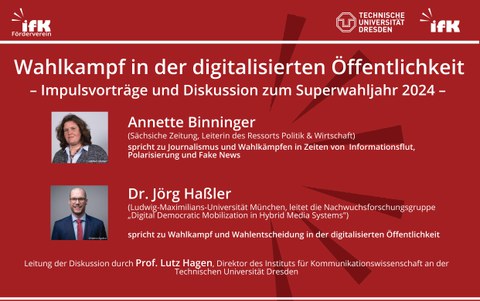Apr 19, 2024
Election campaign in the digitalized public sphere: IfK-event on 29 April
Local elections in Saxony, state elections in Saxony and Thuringia, European elections: Many important elections are on the cards in 2024. What all election campaigns have in common is that they take place in a digitalized public sphere. Social media platforms such as Facebook, Instagram and TiKTok in particular are now home to a wide variety of political channels and players. This means that political communication is increasingly shaped by the rules of attention of the platforms. In some cases, these platforms are competing with journalism of the traditional media, while in others, they are merging with it. In the digitalized public sphere, amateurs and professionals alike can disseminate their own messages en masse and tailor them specifically, even to individual recipients (micro-targeting). But this also poses dangers: Populism, polarization, disinformation.
The IfK will be addressing these topics at its next event on Monday, April 29. Two keynote speeches will shed light on how communication is used in today's election campaigns and how it influences voting decisions: One of the talks will be from the perspective of a leading journalist in the region, the other from the perspective of a communication scientist and expert on election campaigns in hybrid media environments:
Journalism and election campaigns in times of information overload, polarization and fake news
Annette Binninger heads the politics team at Sächsische Zeitung and is one of the editors-in-chief. She writes for the newsletter "Politik in Sachsen" and hosts the podcast of the same name. She studied political science, German studies and sociology before going on to work at the DNN newspaper (Dresdner Neueste Nachrichten). Her previous positions also include being a spokesperson for the Saxon Ministry of Economics.
Election campaigns and voting decisions in the digitalized public sphere
Dr Jörg Haßler heads the junior research group "Digital Democratic Mobilization in Hybrid Media Systems (DigiDeMo)" at the Department of Media and Communication at the Ludwig Maximilian University in Munich. The project is funded by the Free State of Bavaria and coordinated by the Bavarian Research Institute for Digital Transformation.
In the second part of the event, the audience will be able to ask questions. The moderator will be Prof. Lutz Hagen, Director of the Institute of Media and Communication at TUD Dresden University of Technology.
The event starts at 6:30 pm in the Sparkassenforum on Altmarkt (Dr.-Külz-Ring 17). Admission is free. Registration is not necessary.
Contact:
Prof. Lutz M. Hagen
Institute of Media and Communication
Tel.: + 49 351 463-33412

